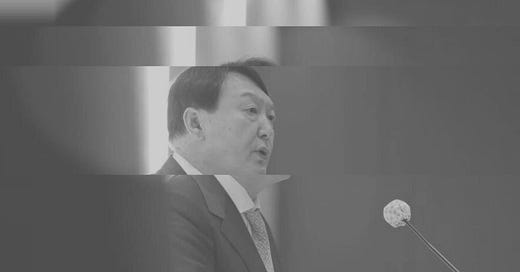On Tuesday, in a risky gambit that few saw coming, South Korean president Yoon Suk Yeol declared martial law. It was short-lived—lasting only six hours—and the fallout is still unfolding. Yet the episode will have major reverberations for South Korean domestic politics and foreign policy, regardless of whether he is impeached.
While many observers are relieved it did not devolve into a full-on coup, Yoon’s attempt at martial rule serves as a stark reminder of how fragile democracy can be and how people must be vigilant to protect their political rights. Yoon’s stunning declaration immediately galvanized South Korean protestors and politicians; within hours of his order, and before troops stormed the National Assembly, lawmakers voted to unanimously to overturn the martial law. South Koreans are still grappling with the shock and uncertainty, even as efforts to impeach Yoon are gaining momentum.
What do these events, and Yoon’s likely downfall, mean for Yoon’s foreign policy? He had invested much of his political capital in strengthening South Korea’s security ties to Japan and supporting the United States’ Indo-Pacific strategy. Yoon aimed to position South Korea as a “global pivotal state” that “advances freedom, peace, and prosperity through liberal democratic values”—words that ring pretty hollow now.
The targets of these policies were clearly North Korea and China. Since taking office in May 2022, Yoon had increasingly adopted anti-communist rhetoric as a part of his broader political strategy, using it both to discredit his critics as “anti-state forces” (bangukga seryeok) and to push for more confrontational policies against North Korea and—to a lesser extent—China. In fact, he used the same narrative of communist insurgency to justify his declaration of martial law.
Yoon’s likely political demise suggests a dramatic shift in South Korea’s foreign policy. Notably, the impeachment bill submitted by opposition parties on Wednesday condemns the president for his diplomatic failures, including “antagonizing North Korea, China, and Russia,” as well as adopting a “peculiar Japan-centric foreign policy.” The bill argues that these decisions have isolated South Korea from the region and heightened the risks of war. Setbacks to Yoon’s foreign policies are thus expected, including most likely reversing (trilateral) cooperation with Japan and the United States.
For now, here are some of the key questions that South Koreans are asking, with foreign policy implications:
What will North Korea do?
So far, North Korea has been quiet. According to the South Korean military, there has not been unusual activity or public reaction from Pyongyang since Yoon’s martial law declaration. That said, some remain concerned that North Korea could try to take advantage of the political chaos in the South, especially if they see an opportunity to stir up trouble.
But a major escalation is unlikely. Yoon’s impeachment is exactly what North Korea wants. In fact, it would be foolish for Pyongyang to make any serious moves to exploit the situation, because that would only legitimize Yoon’s claims of a need for martial law in the South. There is a good chance that, if Yoon is ousted, leader of the liberal opposition Lee Jae-Myung will succeed him. A known dove, he will most likely pursue some form of diplomacy with North Korea.
Nevertheless if North Korea does decide to escalate—or if, in fact, Yoon does out of desperation—then things will most certainly spiral. In this case, the United States would have to assume control of operations by the South Korean military, one that was just deployed to overthrow civilian rule. American policymakers would understandably be quite disturbed to be thrust into this position without any warning or coordination. And that could put the whole alliance to test.
Did the United States know?
But that raises this next question. Washington and the United States Forces Korea (USFK) have thus far claimed that they were not informed in advance of Yoon’s plans to impose martial law. This is a big deal because, historically, the United States has been closely involved in South Korea’s military decisions. In the past, South Korea’s dictators had sought at least tacit approval from the United States before declaring and implementing martial law.
The last time that martial law was enforced was in 1980, when General Chun Doo-hwan killed hundreds of democracy activists in Gwangju—with direct support from Washington. As Tim Shorrock has documented, “[then U.S. president] Carter’s national security team [had] approved the use of force to retake the city and agreed to provide short-term support to Chun if he agreed to long-term political change (that, of course, didn’t happen until he was forced out by massive protests in 1987).” Washington denied any involvement in the Gwangju massacre until 1996. It is a betrayal that remains fresh for many South Koreans.
If it ever came out that Washington had prior knowledge or even some involvement in Yoon’s martial law plans, it could seriously stoke anti-American sentiments. In the past, when the United States was seen as backing authoritarian regimes in South Korea, it led to huge protests. In the 2000s, anti-American sentiment got so strong that, for a while, more South Koreans saw the U.S. as a bigger threat than North Korea. While such a dramatic backlash is less likely today, it is not entirely out of the question.
What about Japan?
All that said, where policy reversal is most likely is on Japan. During his tenure, Yoon has made a number of contentious decisions, including appointing members of the “pro-Japan faction” (chinilpa) to positions of authority, waiving Japan’s responsibility to compensate victims of wartime forced labor (about 1,800 of whom are still alive), and overlooking Japan’s ongoing historical revisionism. The most recent example is Japan’s push—with South Korea’s support—to get the Sado mines listed as a UNESCO World Heritage site without so much as mentioning forced labor.
As I have previously written, there are reasons to expect more swift changes on Japan. For embattled conservatives, this is often the first area of compromise, given broad public support for a more assertive stance on “history issues.” In 2012, for example, following a series of corruption scandals, then conservative president Lee Myung-bak abruptly canceled his plans for a military intelligence-sharing deal with Japan and even made a surprise visit to the disputed territory of Dokdo (Takeshima in Japan). It would not be the first time a South Korean conservative leader reversed course on Japan.
And even if Yoon’s administration were to maintain its Japan-friendly policies, this would only embolden the next liberal president—likely Lee Jae-Myung—to overturn them. That is exactly what happened after Park Geun-hye’s disgraceful exist in 2016. Her progressive successor Moon Jae-in dismantled the 2015 “comfort women” agreement, citing concerns about its democratic procedural legitimacy. Under Moon, relations with Japan hit its nadir, culminating in a tit-for-tat trade war that cost them over a billion dollars. Given Lee’s past promises to “clear the house of Japanese collaborationists” (chinil cheongsan), a similar reversal would not be surprising.
Yoon’s failed gambit portends a dramatic shift in South Korea’s domestic and foreign policy. It is difficult to see how the conservatives will remain in power after Yoon’s term in office ends, by impeachment or not. The next liberal president will want to undo much of Yoon’s legacy. And if history is any lesson, it will most likely start with Japan—rolling back, by implication, South Korea’s trilateral cooperation with Japan and the United States.





